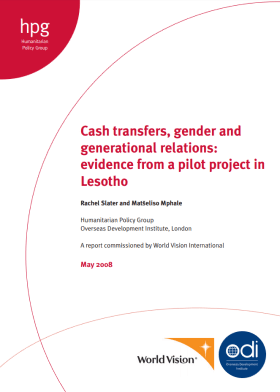Cash Transfers, Gender and Generational Relations: Evidence from a Pilot Project in Lesotho
Food aid has been the main response to repeated and protracted humanitarian crises in Lesotho since 2002, and during that time it has also been the major part of World Vision’s emergency responses. Along with the government, donors and NGOs, World Vision is increasingly interested in the role that cash transfers can play in tackling hunger and vulnerability, and is implementing a pilot cash transfer programme in two districts in Lesotho – Maseru and Mohale’s Hoek.
Whilst the potential for cash transfers to provide an appropriate and affordable response to chronic and emergency food insecurity is acknowledged, there are concerns that cash transfer programmes may have significant negative gender impacts. At the heart of these concerns are assumptions that women are less likely to be able to control the use of cash within the household compared to certain types of in-kind assistance, and that men may use cash for anti-social expenditures – notably on alcohol and cigarettes.
Drawing on the findings of fieldwork with cash, food, cash and food beneficiaries and non-beneficiaries, this paper uses a comparative approach to explore the impact of cash transfers on gender relations.



